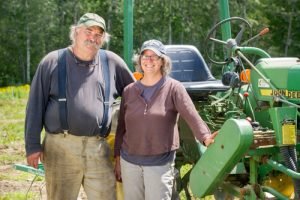Bulletin #4808, Appreciation Feedback
Maine Farms: Life and Business in Balance
Bulletin #4808, Appreciation Feedback (PDF)
By Leah Boyd, Clarity Services; Polly Shyka, Villageside Farm; and Leslie Forstadt, Human Development Specialist, University of Maine Cooperative Extension
For information about UMaine Extension programs and resources, visit extension.umaine.edu.
Find more of our publications and books at extension.umaine.edu/publications/.
For information about UMaine Extension programs and resources, visit extension.umaine.edu.
Find more of our publications and books at extension.umaine.edu/publications/.
This publication series, Maine Farms: Life and Business in Balance, provides ideas for you to consider about the human and relational skills of farming including how to have farm team meetings, stress management, defining roles, and talking about life and business balance, or what some people think of as “work/life integration.” Whatever it means to you, this series is intended to provide you with useful ideas to consider.
Titles include:
- Bulletin #4801, Why Gratitude Matters
Learn how the simplicity of thanks and gratitude can benefit employees and family members. - Bulletin #4802, Successful Farm Team Meetings
Learn some logistics about why and how to have effective meetings with your farm team. - Bulletin #4803, Farm and Family—Finding Balance
Learn how considering your personal experience of balancing can benefit the farm family. - Bulletin #4804, Who Does What on the Farm? The Importance of Roles
Learn how to think about the roles and responsibilities of tasks on the farm and how delegating can help. - Bulletin #4805, Recognizing the Signs of Farmer Stress
Learn to understand that how you’re doing matters and the importance of checking in with the people you work with. - Bulletin #4806, Active Listening to Improve On-Farm Communication
Learn how to listen well so everyone on the team has a chance to speak and be heard. - Bulletin #4807, Farm Coaching to Support Farm-Team Communication
Learn how the benefits of farm coaching can help you to meet your goals. - Bulletin #4808, Appreciation Feedback
Learn new skills on how to give appreciation feedback to motivate your team.

What is “appreciation feedback?”
Appreciation feedback is given when we want to acknowledge how a person’s actions or speech have contributed. The contribution may be to me as an individual, to us in relationship with one another, to the team or family, or to the mission.
Giving general appreciation, like “Great Job” or “You’re the best” is vague and the problem with these types of appreciations is they really don’t let the receiver know what it is that is being appreciated.
By its nature, an appreciation is a judgment, right? We are judging the other person positively! While most people enjoy being appreciated for how they contribute, some experience discomfort with appreciations that aren’t specific and tied to why they matter.
Specific appreciation feedback looks like:
Elements of Appreciation Feedback
- Observation
Example: “I saw you picking up trash in the warehouse this morning!”- How this impacted me, why it mattered
Example: “I’m really appreciating that because I think having the area clean makes it safer for everyone.”
Reflect
Try this writing exercise and fill out the questions below:
- Think of one person to whom you would like to give some appreciation feedback (it can be someone at work or someone outside of work)
- What specifically did they do that you are appreciating? Call on your observation skills!
- How might you word your appreciation to them using the Elements of Appreciation above?
Practice
Practice with a partner. Your partner will play the role of the person you’d like to offer appreciation to. Try out your appreciation and notice how it feels to you to offer it this way. Ask your partner to tell you how it was for them (in the role) to receive this appreciation.
Adapted with permission from Clarity Services, LLC, www.clarityservices.us, 1.877.833.1372
This is material is based upon work supported by USDA/NIFA under Award Number 2018-70027-28588.


Information in this publication is provided purely for educational purposes. No responsibility is assumed for any problems associated with the use of products or services mentioned. No endorsement of products or companies is intended, nor is criticism of unnamed products or companies implied.
© 2020
Call 800.287.0274 (in Maine), or 207.581.3188, for information on publications and program offerings from University of Maine Cooperative Extension, or visit extension.umaine.edu.
In complying with the letter and spirit of applicable laws and pursuing its own goals of diversity, the University of Maine System does not discriminate on the grounds of race, color, religion, sex, sexual orientation, transgender status, gender, gender identity or expression, ethnicity, national origin, citizenship status, familial status, ancestry, age, disability physical or mental, genetic information, or veterans or military status in employment, education, and all other programs and activities. The University provides reasonable accommodations to qualified individuals with disabilities upon request. The following person has been designated to handle inquiries regarding non-discrimination policies: Director of Equal Opportunity, 5713 Chadbourne Hall, Room 412, University of Maine, Orono, ME 04469-5713, 207.581.1226, TTY 711 (Maine Relay System).

